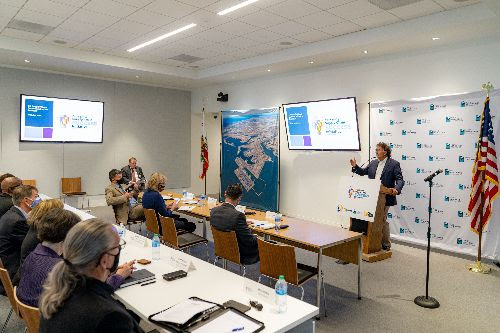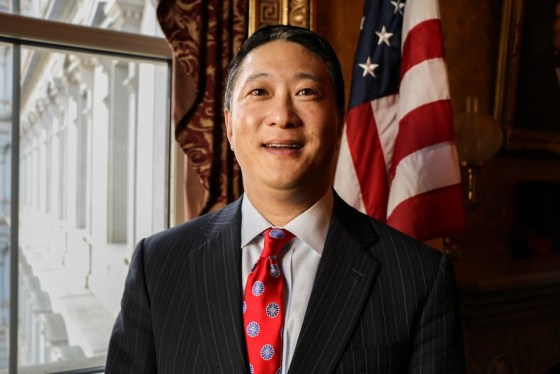
Port of Long Beach hosts Supply Chain Summit
Federal, state, local stakeholders discuss solutions to shipping congestion
Transportation and goods movement officials and other stakeholders gathered Tuesday at Port of Long Beach headquarters to broaden efforts aimed at speeding up the movement of goods amid a historic cargo surge that started in July 2020.
The California Supply Chain Success Initiative brought together federal, state, and local leaders within the goods movement industry to develop immediate and long-term solutions to congestion such as 24/7 terminal operations, digitizing information, improved collaboration, and strengthening freight policies for seaports across the country.
“Many of the supply chain challenges we are witnessing were already occurring prior to the pandemic, but are now magnified due to our high cargo volumes,” said Mario Cordero, Executive Director of the Port of Long Beach. “We’re rolling up our sleeves and working with state and federal stakeholders to address the bottlenecks, price spikes, and other issues created by congestion at our nation’s ports.”

Harbor Commissioner Steven Neal
“We are collaborating with some of the brightest stakeholders in the goods movement industry to tackle these disruptions and keep the economy humming,” said Long Beach Harbor Commission President Steven Neal. “We are looking at every possible solution to determine what can be done now, and how we can keep the momentum moving into the future.”
The summit was co-sponsored by the Port of Long Beach, the California State Transportation Agency, the California Governor’s Office of Business and Economic Development, and the Center for International Trade and Transportation at California State University, Long Beach.
“I’m proud to be here today working with a wide range of stakeholders on realistic and actionable solutions to these persistent supply chain problems,” said Dee Dee Myers, Director of the Governor’s Office of Business and Economic Development, known as GO-Biz. “It’s truly an all-hands-on-deck moment, and I’m excited for our partnership moving forward.”

David S. Kim
“California’s ports are one of our state’s and nation’s most critical transportation assets and a crown jewel of America’s freight system,” said California State Transportation Agency Secretary David S. Kim. “I’m proud to work with our summit partners on solutions to improve the movement of goods throughout the supply chain and maintain our state’s competitive edge.”
“There are many issues contributing to congestion in the supply chain and they are beyond the ability of anyone organization to address,” said Federal Maritime Commission Chairman Dan Maffei. “If we truly want to increase capacity, reduce congestion, and improve reliability, we must get all the stakeholders to commit together to moving cargo and containers in off-peak hours and thinking more broadly about how each one of them can do their parts. This convening is a vital step in that, and I am grateful to be here in Long Beach to participate in the discussion.”
Along with Cordero, Neal, Myers, and Maffei, attendees included Long Beach Harbor Commission Vice President Sharon L. Weissman; Long Beach Harbor Commissioner Bonnie Lowenthal; Dr. Noel Hacegaba, Deputy Executive Director of the Port of Long Beach; Karen Ross, Secretary of the California Department of Food and Agriculture; Elissa Konove, Undersecretary of the California State Transportation Agency; Lucinda Lessley, Acting Administrator of the U.S. Department of Transportation’s Maritime Administration; and John Porcari, Port Envoy to the Biden Administration’s newly created Supply Chain Disruptions Taskforce.
The gathering was held just days after the ports of Long Beach and Los Angeles announced a joint effort to expand operating hours that will allow trucks to pick up and return shipping containers as a measure to improve freight movement and reduce delays through the shared ports complex.









